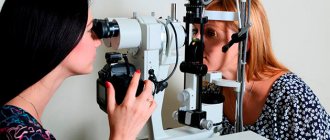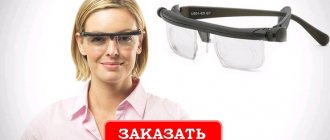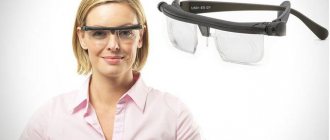What do glasses give us?
Glasses help you see well, but do not improve your vision
Read another article on our website that describes how to choose the right glasses for your face shape . It tells you how to choose frames for a woman, a man, or a child.
Young people who want to avoid military service are often interested in issues of vision and wearing glasses. Conscripts trying to escape military life by any means possible are ready to take radical measures aimed at worsening their health. But when choosing this “escape” option, you need to know that only those with serious ophthalmological pathologies are exempt from military service. What do glasses give us?
Those who want to wear glasses are joined by a category of people who prefer business attire. After all, such an accessory in a good, expensive frame “fits well” into the image of a modern successful person. In addition, stylists suggest wearing this stylish piece of clothing to young people who are insecure or have a pronounced childish appearance in order to give their face brutality and age.
But you shouldn’t try to ruin your eyesight just to look more confident in the eyes of others. After all, chasing a momentary dream can lead to disastrous results in the future. It’s quite easy to ruin your vision, but it’s much more difficult to preserve it.
Vision correction with glasses
To correct vision in case of myopia with the help of corrective agents, the ophthalmologist prescribes the use of glasses and lenses. The choice of remedy depends on the characteristics of the body and the degree of myopia.
The optical power is indicated by a negative number. For myopia, glasses are prescribed to be worn outdoors and for other activities in which it is necessary to see objects that are far away. To work with objects, you can use glasses with positive optical power: this scheme allows you to rebuild the eye muscles and vision improves.
It is worth noting that the method of vision correction using glasses has some disadvantages. Thus, they greatly limit the field of vision, interfere with sports and other physical activities, fog up, etc. In addition, the lens of the glasses is removed from the eye, so the size of the image projected onto the retina changes, which is why it is perceived differently from what it really is. Lenses do not have all these disadvantages: with them the image does not change size, they are more convenient during physical activity.
I want to wear glasses, but my vision is good: what should I do?
I want to wear glasses, but my eyesight is good.
How to look stylish without ruining your eyesight? I want to wear glasses, but my vision is good - what should I do? We need to dwell on this point in more detail.
Glasses in an elegant, expensive frame are a bright touch in the image of a successful person. If the desire to wear an accessory is great, you need to pay attention to practical advice from experts:
- You should not choose glasses with glass lenses. Glass is a hazardous material. In many countries, children, teenagers and public transport drivers are prohibited from wearing these optics. The lens may break and damage the eye.
- It is very harmful for a healthy person’s vision to wear glasses prescribed by an ophthalmologist as a necessary accessory for other patients. Friends with poor eyesight should not use glasses. Even wearing them for a short time, with incorrectly selected lenses, can ruin your vision.
- When choosing glasses, you do not need to be guided by the “scales” rule . For example, using minus one contact lenses while wearing plus one prescription glasses. This creates additional tension in the eye muscles, which can negatively affect your health in the future.
- For the comfort of healthy eyes, it is better to opt for zero diopters . But in this case, in order not to look unnatural, use a high-quality frame with transparent, chrome-plated or slightly tinted zero lenses.
Choose your glasses wisely so as not to spoil your good vision. But it is worth noting that many people still want to do this for many reasons. We advise you to think a hundred times first. If you have made this decision, then read the information below.
Glasses for myopia in children
It is impossible to completely cure myopia in children. However, it is necessary to stop the progression of the disease, so treatment includes:
- stopping the development of the disease;
- prevention of complications;
- vision correction.
For correction, the doctor prescribes glasses for the child. If myopia is congenital, an optician should be prescribed as early as possible. It relieves tension from the visual organs and stops the loss of vision. A child should wear glasses only on the advice of an ophthalmologist. Upon reaching adulthood, myopia can be cured using laser surgery.
Prevention is of great importance. It consists of proper organization of the workspace (location in front of the computer, breaks during work, normal lighting), proper nutrition, and performing exercises to train accommodation, which can be performed both at the workplace and at home. It is also important to spend more time outside in natural light, the lack of which is one of the main causes of myopia, especially in childhood.
How can you ruin your eyesight?
You can ruin your eyesight.
To decide whether to purchase glasses, you should first decide for how long you will be purchasing the stylish accessory. If it is expected that wearing will be long-term, and it does not negatively affect the health of the eyes in the future, it is necessary to “protect” your health in advance.
Vision is the main conductor between a person and the outside world. We receive about 70% of information through our eyes. This organ of perception is the most vulnerable; it is constantly affected by external conditions - bright sun, wind, dust. In addition, the state of vision is affected by something that cannot be avoided:
- Internal processes in the human body - aging of the body, etc.
- Diseases that lead to deterioration of eye health are diabetes.
- The enormous burden that modern people experience is sitting in front of a computer, constantly holding a phone in their hands, etc.
There are many other factors that can ruin visual function. The list of the most “popular methods” includes:
- Reading in transport . Eye strain while moving a metro train, tram, trolleybus or bus not only causes the pupil to strain, but also causes it to constantly narrow and dilate. This increases the load on the eye muscles and further causes a decrease in visual acuity. This stress also causes reading in poor lighting.
- Watching TV at close range . A small distance between the screen and a person causes overstrain of the eye muscles.
- Traumatic situations . The resulting injury can lead to displacement of the cornea or lens, which negatively affects visual function.
- Direct sunlight . If you refuse to wear sunglasses, the risk of developing glaucoma, macular degeneration and other eye pathologies increases. Ophthalmologists advise taking the purchase of protective optics seriously, as low-quality glasses can subject the eyeballs to additional stress.
- Lack of vitamins and microelements in food . Deficiency of vitamins A, B, C and various minerals becomes one of the reasons for the progression of ophthalmic pathologies.
- Incorrectly selected lenses . Lenses that do not suit your visual acuity add additional stress to the eye muscles. It is especially harmful to use someone else's optics if your eyes are healthy.
- Staying in dusty, smoky rooms or working in chemical plants leads to the development of cataracts.
- Ignoring initial alarming symptoms from the organ of vision . Negative phenomena such as inflammation, itching, increased lacrimation, “bursted blood vessels” can subsequently cause loss of visual acuity.
All of the factors or “methods” described above can significantly damage vision. For even more details, watch the tips in the video below.
Why do sunglasses tire your eyes?
The cause of unpleasant sensations in the eyes when wearing sunglasses may be an incorrectly selected shade of lenses, as a result of which they not only do not absorb ultraviolet radiation, but, on the contrary, increase its negative impact. It is best to purchase products with brown or gray lenses - they provide sufficient protection from UV radiation.
If you need sunglasses for use in special conditions - for example, in the mountains (snow) or in particularly bright, blinding sunlight - it is better to purchase specialized models for these purposes. They will provide reliable eye protection and will not cause any inconvenience.
Does wearing glasses worsen vision: why shouldn’t you rush to wear glasses?
Wearing glasses can impair vision.
Unfortunately, wearing glasses does not guarantee that vision can gradually be fully restored. This is a more complex process associated with hereditary factors, abnormal eye structure, and acquired diseases.
- Glasses only relieve additional increased strain on the eyes.
- The muscles tense less, which ultimately helps slow down further decline in visual acuity.
- Therefore, the use of glasses is the most affordable and easiest way to exclusively correct vision.
- But in turn, this has negative sides.
So, does wearing glasses worsen your vision? Why shouldn't you rush to buy glasses?
- Constant use of glasses gives the effect of visual acuity only for a short period of wearing them. When removed, vision deteriorates.
- Research by American scientists suggests that even if a patient is given glasses that correspond to his medical indications, the eyeball continues to strain when using them.
- Glasses only help to reduce external signs of deviation in eye reflexion, without eliminating the deeper causes.
- Some patients in the research group reported further deterioration of vision, for no apparent reason.
- Even correctly selected glasses do not stop the development of the disease. Therefore, ophthalmologists recommend undergoing an examination once a year in order to correct the required amount of lens diopter.
Worth knowing: Full functioning of every human organ is possible when using all available potential. If some functions are performed with the help of an auxiliary apparatus, then atrophy of the muscles not involved in work gradually occurs.
Also, one of the unfavorable factors of the impact of optics is that the glasses do not provide the opportunity to cover the full radius of the panorama. Healthy eyes look in different directions, constantly changing the viewing angle, while glasses provide the opportunity to see only part of the external picture. Because of this:
- Over time, the eyeball becomes inactive; having gotten used to glasses, a person turns his head only to the object of interest to him.
Constant use of glasses can lead to disruption of the retina's sensitivity to color. Patients may experience increased nervousness. An incorrectly selected frame, squeezing the temporal part, impairs blood circulation and causes headaches.
But it also happens differently!
Exactly. It also happens differently - and then glasses are not a threat, but salvation.
Firstly, they help you see the world in all its beauty - but, of course, it’s not just about beauty. Poor vision is a serious limitation in life opportunities. For example, people suffering from myopia cannot drive a car without glasses, and walking forays of those who have difficulty distinguishing surrounding objects are also associated with a lot of dangers and inconveniences. The quality of vision does not matter except in sleep, so in this case glasses are a means of solving a very, very important problem.
Secondly, in some situations, glasses can preserve and even improve vision. Let's take squint. Wearing glasses for this disease reduces the risk of developing complications - such as amblyopia, an extremely dangerous disease, the development of which can result in deterioration of vision up to blindness. In addition, glasses can become a means of stabilizing and even correcting strabismus, so people with this diagnosis should definitely not refuse optical vision correction.
Thirdly, wearing glasses is an opportunity to avoid problems not only with vision. For example, with the same myopia, glasses protect the eyes from overwork, which can cause frequent and painful headaches and the appearance of other unpleasant symptoms...
Myths about glasses for good and poor vision
Myths about glasses for good and poor vision
Each person faced with the problem of poor vision independently decides the question of how long to wear glasses, sometimes not really trusting the opinions of oculists. There are several reasons for refusing corrective optics. Many, citing the medical myth about the dangers of wearing glasses, wear them only while reading or watching television programs. Someone doesn’t like the way a person looks with glasses or the person becomes the object of constant ridicule. Below we will describe myths about glasses for good and poor vision.
Surprisingly, the effect of long-term wearing of glasses has been little studied by specialists. Available data do not confirm damage to health, but ophthalmologists nevertheless point to a decrease in the activity of the eyeball. It becomes lazier and more difficult to focus on objects. At the same time, complete refusal of glasses leads to additional tension in the eye muscles, headaches, and discomfort.
Advice: Do not trust numerous media publications and other sources that say the basic rule for choosing glasses is that they must be chosen according to the shape of your face. This is an erroneous statement that in some cases does more harm than good.
When choosing an accessory, you must consider a number of criteria:
- Accurate determination of visual acuity, since lenses with a large number of diopters may not fit into all frames.
- Further use of glasses - reading, looking into the distance, constant wearing.
- Own opinion. You have to like glasses so that you want to wear them.
The myth about constant headaches has a medical basis. Headaches can only occur in the following cases:
- Incorrectly selected lenses
- Uncomfortable frame
- People suffering from hypermetropia, especially when they have to look closely at objects of interest for a long time.
Myths also include the well-known opinion that only smart people wear glasses. This is a fairly popular opinion, which is successfully used by style consultants, coaches, and popular celebrities.
When choosing glasses, it is important to remember that any visual impairment can be corrected with properly selected glasses or contact lenses. Optics is a traditional way of helping the eyes. It is not a treatment. The selection of glasses should only be carried out by an ophthalmologist. It is prohibited to purchase optical products, even if it is only part of the image, without prior consultation with a specialist. Good luck!
Degrees of myopia
There are three stages of this pathology:
- initial;
- average;
- high.
At initial stages, vision can be restored by performing eye exercises. Glasses can also help improve your vision if you wear them as needed. At the middle and high stages, wearing them will be almost constant.
It is worth knowing that spectacle optics increases vigilance, affecting the symptoms of the disease. It cannot cure myopia. In addition, if you do not follow your doctor's recommendations for wearing glasses, your vision may deteriorate even further.
Thus, although glasses are the simplest and most common means of correction, they still have a number of disadvantages:
- They only help while you are wearing them;
- are not a therapeutic agent;
- may cause damage due to improper use.
The whole truth about vision
There are a lot of stereotypes associated with vision. For example, that from eating carrots a person begins to see better.
There is so much that ophthalmologists have to listen to during an appointment! And the time allotted for a thorough examination of the patient is consumed by work.
Get acquainted with a short list of myths about your eyes and see the light.
Leading American ophthalmologists will help dispel myths about vision: Richard Rosen - director of ophthalmological research at the New York Eye and Ear Clinic, Dr. Jay Pepoz from the Vision Institute in St. Louis, Kenneth Chang from the Massachusetts Eye and Ear Clinic, as well as New York optician Harvey Moscot.
Myth 1. Squinting will ruin your eyesight.
In fact: this habit may only indicate that you need glasses. “You can squint all you want,” says Jay Pepoz. “This is just an attempt to narrow the pupil so that it lets in a narrower beam of light. Closing the eyelids at the same time improves the focus of vision.”
“The need to squint indicates a problem with the refraction of light inside the eye, when the image does not reach the retina, and this leads to blurred vision. With this type of vision, you can either squint or wear glasses,” explains Dr. Kenneth Chang.
People who squint their eyes do not worsen their vision, but this habit does have its side effects.
“This sometimes leads to headaches because the process of squinting involves contraction of the facial muscles. And it adds wrinkles,” explains Dr. Rosen.
Myth 2. We will have the same eye problems as our parents.
It is possible that sometimes. Many eye problems are hereditary, but as with all genetic problems, there is no guarantee that they will be inherited.
“Diseases such as glaucoma are often inherited,” says Dr. Chang. “In such cases, you still need to undergo regular examinations by an ophthalmologist.”
Myth 3. Strabismus in children goes away with age
Fact: childhood strabismus always requires treatment.
“If parents or kindergarten teachers see that their child’s eyes are crossed, or they think that the child is rubbing them too much, they should immediately visit an ophthalmologist,” Chang emphasized. “Delayed treatment for strabismus may not be successful.”
When vision is formed, certain cells in the retina responsible for capturing images provide a three-dimensional picture of them, and “if they are not stimulated early in life, which is what happens with strabismus, then they stop developing,” Rosen explains.
Myth 4. If I don’t see problems with my child’s eyes, then I can skip the planned visit to the ophthalmologist
In fact: "Every child should see an eye specialist by age three," says Dr. Chang, "if only to rule out the possibility of amblyopia and strabismus."
Dr. Moskot added that the medical history of the child's immediate family members may also influence the timing of the first visit to the doctor.
Common myths about eyes and their health
Popular myths about vision and what is actually harmful and what is good for our eyes, says ophthalmologist at the Mogilev City Emergency Hospital Irina Semenova.
- Myth 1. Poor-quality cosmetics or cosmetics left overnight can damage your eyesight.
No. It can ruin your eyelids and skin. - Myth 2. Vitamins and dietary supplements are very good for the eyes
Yes, it’s true, but you should use them without fanaticism. After all, they contain a complex of vitamins: for example, selenium and zinc, which are important for each of us, which affect both the general condition of the body and vision.
You don’t need to drink them all the time, but doctors advise their patients to take such tonics for three months, after which they take a break.
- Myth 3. Green color has a beneficial effect on vision.
This is partly true. Green color has a beneficial effect on the psyche and calms, and yellow, by the way, too. But they have little to do with the eyes. - Myth 4. LCD screens protect against vision problems
No, not true. Radiation comes from any television or computer screen. And the vision strains in front of any of them, even in front of very good and modern ones. Shields or LCD screens may only absorb some of the radiation but may not completely remove the hazard. - Myth 5. A modern child from an early age cannot do without a TV and a computer.
This is a misconception that leads to vision problems in children due to the carelessness of their parents, who at the age of three sit the child in front of the computer, and at five they are surprised that he does not see something.Ideally, a child aged 5 – 12 years should receive TV and a computer in doses: about 30-40 minutes twice a week. And for young children, TV and computers should be completely contraindicated.
- Myth 6. School tablets are absolutely harmless
More likely no than yes. Tablets can only be recommended for high school students and only if certain visual hygiene is observed. The teacher must ensure that children are distracted from working in front of screens every 10-15 minutes and switch to another activity.
- Myth 7. When a child goes to school, the load on his vision becomes so great that it will fall anyway
Not true. There are certain rules, simple and important, that many of us know, but are too lazy to follow. Meanwhile, they can help keep your eyes in order.In the lower grades, the teacher should conduct eye exercises. The lighting in which children work, read or write is also very important.
At home, the workplace for a schoolchild should also be equipped taking into account all hygiene requirements.
Let us also note that it is better for schoolchildren to visit an ophthalmologist several times during the school year, since it happens that in September a child has “1” vision, and in the spring he already sees only half of the table.
- Myth 8. If children are slapped, the child may lose their vision.
The truth is that the occipital part of the brain is responsible for vision, so damage to it can actually lead to vision problems. Well, you shouldn’t give children slaps on the head anyway. - Myth 9. A person working at a computer’s vision adapts to high daily loads.
Not true. Those who work at a computer need to visit an ophthalmologist every six months. Then, in the early stages, you can detect some “problems” with the eyes and try to eliminate them or slow down the development of the disease.If you wait for pronounced symptoms, you can become one of those patients who at 35 or 40 years old comes with the words: “Doctor, I don’t see anything.” And the doctor looks into the eyes and understands that vision in one of them has already been irretrievably lost, and in the other it is rapidly declining.
- Myth 10. Phones, iPhones and e-readers damage your eyesight.
Yes, and they cause no less harm, and due to their own size and stress, even more than desktop computers.
- Myth 11. Reading books is no less harmful than playing on the computer.
Not true. This is often the case among those who damaged their eyesight in childhood by reading books under a blanket with a flashlight in their hand.If you follow the basic rules, in particular, monitor the lighting and the correct position while reading, it will not cause harm. Vision will deteriorate if you read in the dark, lying down or under the bright sun.
- Myth 12. Dropping urine, honey and blueberry juice into your eyes is beneficial.
You shouldn't experiment with your vision like that. When treating vision problems, you should not get carried away with urine therapy at all, and honey and blueberries can cause serious irritation and an allergic reaction.For those patients who really want to try similar methods of eye health, I advise you to instill honey, diluting it in a ratio of 1 to 10, and only if there are no adverse reactions, make these drops more concentrated.
Naturally, you should first make sure that the patient is not allergic to bee products.
- Myth 13. Non-traditional treatment methods can help with vision problems: homeopathy, herbal medicine, acupuncture
Everything is good in the aggregate. They can help, but they won't get rid of problems. I have not met a single patient who could be completely cured using these methods. But many people have lost their sight... - Myth 14. An ophthalmologist can only test visual acuity and select glasses.
Not true at all. Some diseases, such as diabetes or brain tumors, are often first detected by ophthalmologists.Also, the condition of the retina shows the consequences of traumatic brain injuries and some other conditions of the body as a whole.
- Myth 15. If a person looks at the world one-sidedly or does not want to notice some important things in his life, he will have poor eyesight.
Not true. In ophthalmology, psychosomatics manifests itself extremely rarely. Basically, all eye diseases have their own nature and their own cause - be it infections, injuries or a reflection of the internal state of the body.
Source https://zdorovie.com/health/18-mifov-o-zrenii/20710











